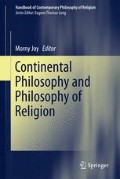Abstract
This book will survey the work of twentieth-century Continental philosophy and its potential impact on philosophy of religion as it is practised predominantly in English-speaking countries. The term “Continental philosophy,” insofar as it refers to religion, can be ascribed to a tradition of thought that dates from the time of Kant, resulting from the demise of natural theology, where it had been assumed that human beings could have knowledge of God. Other philosophers connected with this tradition who have specific association with the subject of religion, if not necessarily an affinity for it, are Hegel, Nietzsche, and Kierkegaard. In the first half of the twentieth century, the major philosophers identified with this philosophy are Husserl and Heidegger, and then, more recently, from the 1970s onwards, French thinkers such as Jacques Derrida and Michel Foucault are included, as well as Luce Irigaray and Julia Kristeva. The Frankfurt school of critical theory, exemplified at the present time by the work of Jürgen Habermas, has also not been without some influence.
Access this chapter
Tax calculation will be finalised at checkout
Purchases are for personal use only
Notes
- 1.
One of Gadamer’s more interesting statements in connection with religion concerns the unfortunate way it has used philosophy dogmatically. As a response, he states: “Yet, when modern philosophy begins to entrust itself to the ancient path of thought, perhaps thinkers will learn once again to discern the ancient content of the concept of God” (1999: 17).
- 2.
I have written elsewhere on some of the problems that I have discerned in the early adaptations of phenomenology to more theological purposes, and the problems this created in Religious Studies (Joy 2004).
Bibliography
Anderson, Pamela. 1997. A feminist philosophy of religion: The rationality and myths of religious belief. Oxford: Blackwell.
Bello, Angela Alles, 2009. The divine in Husserl and other explorations, Vol. 98, Analecta Husserliana, Dordrecht, The Netherlands: Springer.
Capps, Walter H. 1995. Religious studies: The making of a discipline. Minneapolis, MN: Fortress Press.
Collins, James D. 1967. The emergence of philosophy of religion. New Haven, CT: Yale University Press.
Crowe, Benjamin D. 2006. Heidegger’s religious origins: Destruction and authenticity. Bloomington, IN: Indiana University Press.
Foucault, Michel, and Ludwig Binswanger. 1993 [1954]. Dream and existence. In Studies in existential psychology and psychiatry, ed. Keith Hoeller, Atlantic Highlands, NJ: Humanities Press.
Foucault, Michel. 1976 [1962]. Mental illness and psychology. (Based on Maladie mentale et psychologie) (trans: Sheridan, Alan). New York, NY: Harper and Row.
Frankenberry, Nancy. 1998. Philosophy of religion in different voices. In Philosophy in a feminist voice: Critiques and reconstructions, ed. J.A. Kourany. Princeton, NJ: Princeton University Press.
Gadamer, Hans-Georg. 1999. Hermeneutics, religion & ethics (trans: Weinsheimer, Joel). New Haven, CT: Yale University Press.
Hart, James G. 1986. A precis of an Husserlian philosophical theology. In Essays In phenomenological theology, ed. S. Laycock and J.G. Hart. Albany, NY: State University of New York Press.
Heidegger, Martin. 1976. Only a god can save us: Der Spiegel’s interview with Martin Heidegger. Philosophy Today 20: 267–284.
Janicaud, Dominique. 2006. Phenomenology “wide open”: After the French debate (trans: Cabral, Charles C.). New York, NY: Fordham University Press.
Jantzen, Grace. 1999. Becoming divine: Towards a feminist philosophy of religion. Bloomington, IN: Indiana University Press.
Joy, Morny. 2000. Beyond a god’s-eye view: Alternative perspectives in the study of religion. In Perspectives on method and theory in the study of religion, ed. A. W. Geertz and R. McCutcheon, 110–140. Leiden: Brill.
Joy, Morny. 2004. Philosophy and religion. In New approaches to the study of religion. Vol. 1. Regional, critical and historical approaches, ed. P. Antes, A. Geertz, and R.A. Warne, 185–217. Berlin: de Gruyter.
Laycock, Stephen. 1988. Foundations for a theological phenomenology. Lewiston, NY: Edwin Mellen Press.
Long, Eugene T. 2000. Twentieth century western philosophy of religion 1900–2000. Dordrecht, The Netherlands: Kluwer.
Otto, Rudolf. 1957. The idea of the holy. Oxford: Oxford University Press.
Raschke, Carl. 1982. The deconstruction of god. In Deconstruction and theology, ed. Thomas J.J. Altizer, Max A. Myers, Carl A. Raschke, Robert P. Scharlemann, Mark C.Taylor, and Charles E. Winquist. New York, NY: Crossroads.
Ricoeur, Paul. 1967. Husserl. Evanston, IL: Northwestern University Press.
Schalow, Frank. 2001. Heidegger and the quest for the sacred: From thought to the sanctuary of faith. Dordrecht, The Netherlands: Kluwer.
Theunissen, Michael. 1986. The other: Studies in the social ontology of Husserl, Heidegger, Sartre and Buber (trans: Macann, C.). Cambridge, MA: MIT Press.
Tracy, David. 1990. On the origin of the philosophy of religion: The need for a new narrative for its founding. In Myth and philosophy, ed. F. Reynolds and D. Tracy, 11–36. Albany, NY: State University of New York Press.
Van der Leeuw, Geradus. 1963. Religion in essence and manifestation. 2 Vols. New York, NY: Harper & Row.
Vedder, Ben. 2007. Heidegger’s philosophy of religion: From god to gods. Pittsburgh, PA: Duquesne University Press.
Author information
Authors and Affiliations
Corresponding author
Editor information
Editors and Affiliations
Rights and permissions
Copyright information
© 2011 Springer Science+Business Media B.V.
About this chapter
Cite this chapter
Joy, M. (2011). Introduction. In: Joy, M. (eds) Continental Philosophy and Philosophy of Religion. Handbook of Contemporary Philosophy of Religion, vol 4. Springer, Dordrecht. https://doi.org/10.1007/978-94-007-0059-8_1
Download citation
DOI: https://doi.org/10.1007/978-94-007-0059-8_1
Published:
Publisher Name: Springer, Dordrecht
Print ISBN: 978-94-007-0058-1
Online ISBN: 978-94-007-0059-8
eBook Packages: Humanities, Social Sciences and LawPhilosophy and Religion (R0)

